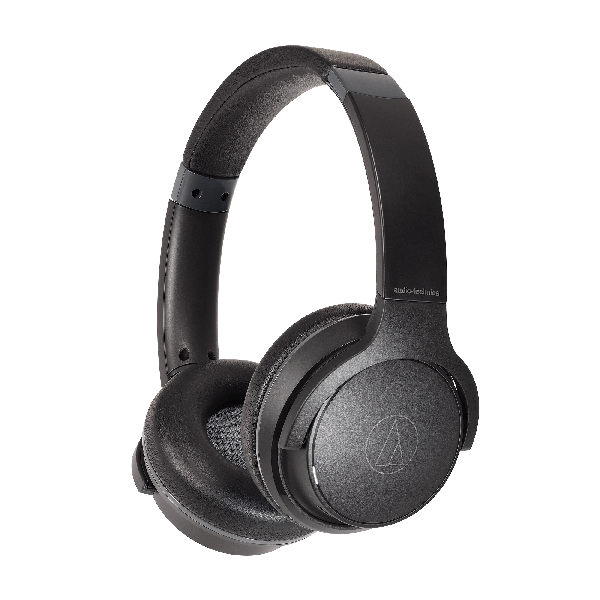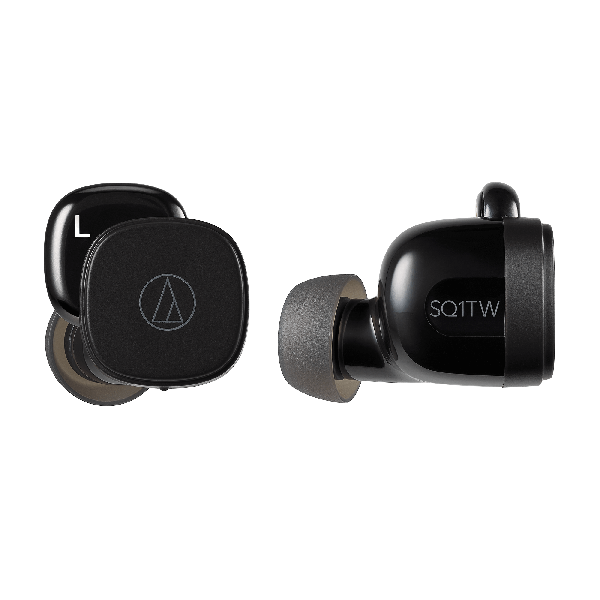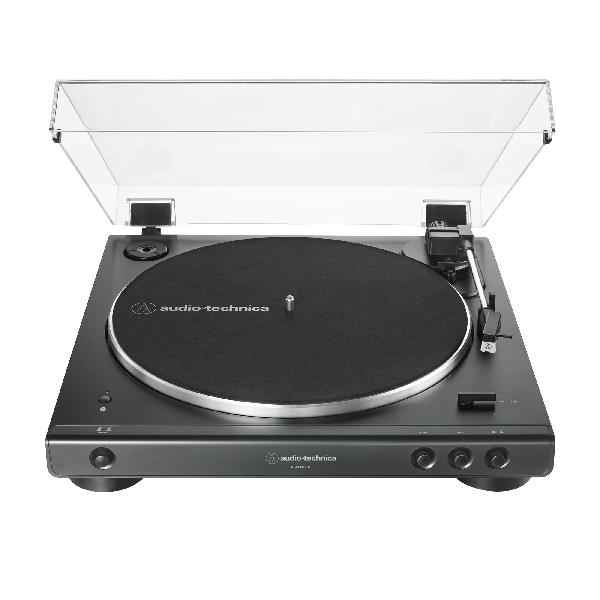Updated: April 4, 2023
Have you ever wondered why you feel so great when listening to your favorite track or tuning into your favorite radio station?
Music can trigger a variety of chemical reactions in your brain that contribute to relaxation. From reducing stress hormones to stimulating feelings of happiness, music can almost instantly translate to a good mood. These feel-good effects also produce a number of positive long-term benefits for your body, such as lower stress and anxiety levels, better sleep patterns, and improved overall health and well-being.
So, it’s not just in your head – the tunes you listen to greatly impact your mood. Read on to find out the science behind the relaxing effects of music.

3 Ways Music Aids in Relaxation
Music Reduces Stress-Related Hormones
Studies have found that listening to music can lower your body’s levels of cortisol, a hormone that can contribute to feelings of stress and anxiety.
For example, in high-stress situations such as surgery, music has been proven to keep patients’ stress levels under control. In one study, researchers found that patients who listened to music while undergoing surgery had lower levels of cortisol when compared to patients who didn’t listen to music during the procedure.
Research has also found that the tempo of the music can have a significant impact on how music can help lower your stress. Music with a low pitch and a slower tempo of 60–80 bpm, such as mellow jazz, can help in reducing stress levels.
As a result of stress and anxiety reduction, music can also contribute to better sleep habits. Listening to music before going to bed has been shown to improve sleeping patterns and can be used to treat insomnia. Since sleeping is another natural stress-reducer, the cycle of listening to music to reduce stress will also result in lower stress levels experienced as a result of better sleep habits.
Music Has Therapeutic Effects on Your Brain
Listening to music not only elicits strong emotional responses and memories, but can also affect the very structure of the brain. Research suggests that music may be helpful in treating the anxiety, depression, and pain associated with many health conditions.
Music appears to have such a strong, therapeutic effect on your mental health that there are dedicated music therapists. Like other types of counseling, music therapists customize treatment plans for patients with a variety of music and use music as a tool to help people comprehend their emotions.
Music Stimulates Feelings of Happiness
Listening to your favorite music can also trigger hormones in your body that translate to an instant good mood.
According to researchers, listening to music triggers the release of dopamine in your brain. Dopamine is a neurotransmitter that promotes feelings of happiness and excitement.
Particularly, listening to new music, rather than the same old playlist, results in the largest production of dopamine and happiness. When you listen to the same music repeatedly, you aren’t likely to experience the same effects as when you discover new music, according to research.
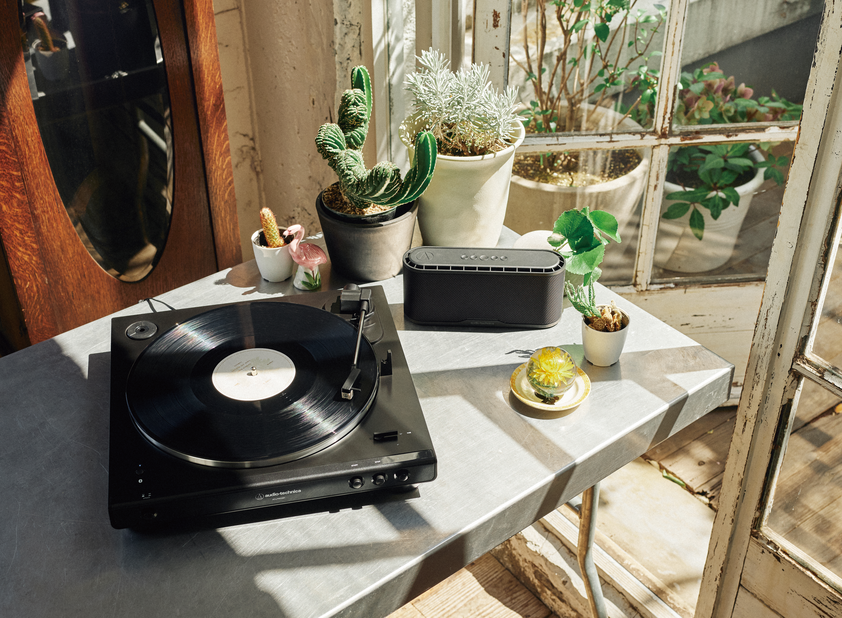
Music Helps with Better Sleep
It turns out that lullabies aren’t just for babies and children! A recent study found adults who listened to 45 minutes of music before going to sleep reported having a better night’s rest and sleep quality.
Research shows that longer sleep doesn’t necessarily mean better sleep. As there are a few factors that contribute to the quality of sleep, one primary factor is how well your brain waves slow down after 90 minutes of falling asleep. This stage of the sleep cycle is called Rapid Eye Movement (REM). Adding music to your nightly routine or prior to going to sleep can help facilitate this stage of sleep, resulting in an improved night’s rest.
Not only does listening to music help in having an overall better night’s sleep, but also assists in falling asleep. In a recent study, women with symptoms of insomnia played music of their choice for 10 consecutive days before going to sleep, which resulted in them falling asleep in 6–13 minutes. Prior to listening to music, it took these women 27–69 minutes to fall asleep.
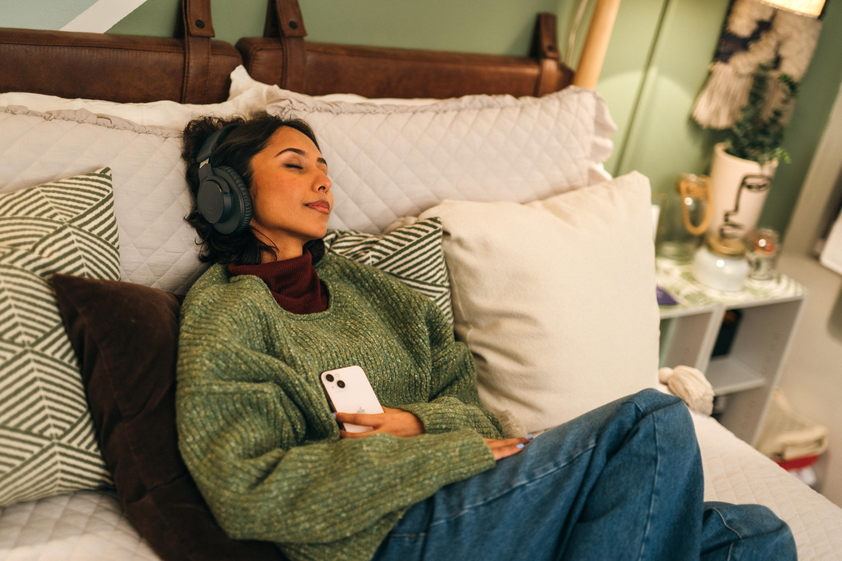
Incorporate Music into Your Nightly Routine
Adding music to your nightly routine is extremely beneficial as it can aid with relaxation, falling asleep, and even staying asleep. Below are a few tips to make music a part of your sleeping regimen:
- Make music a habit! Creating evening rituals to help prepare for sleep consistently will help improve your sleep over time.
- Keep your favorite headphones or turntable near your resting spot so you can make it a habit to use music to settle down at the end of your day
- Create a playlist with enjoyable, relaxing songs with a slower tempo as these types of songs have shown positive results in aiding in sleep.
- When creating the playlist, avoid songs that invoke strong emotions as this could have the opposite effect when trying to sleep. Try lyric-free songs as lyrics can be stimulating, causing you to not fall asleep.
The Best Type of Music for Relaxation
As mentioned above, the type of music you listen to affects your body in different ways, which can result in different moods.
Just as fast, upbeat music may provide a burst of energy while exercising, slower music has been shown to be more relaxing. Classical music, in particular, can help slow the pulse and heart rate, as well as decrease levels of stress hormones. So, if you’re looking to wind down after a long day, opt for slower instrumental, classical, or ambient music.
The Best Audio Equipment to Help You Relax
We feel the best way to enjoy and really benefit from the scientific effects that music has on your body is by listening to your favorite songs on high-quality, noise-cancelling headphones from Audio-Technica. Below are some of our go-to headphones for music listening, from comfortable over-ear headphones to in-ear designs, that suit every listener’s needs.
 Available in six colors with a modern square design, the ATH-SQ1TW allows you to relax in style. These premium earbuds come equipped with Bluetooth® wireless technology and have a 6.5-hour battery life. Users never have to worry about sound delays while relaxing with these low latency wireless headphones for music.
Available in six colors with a modern square design, the ATH-SQ1TW allows you to relax in style. These premium earbuds come equipped with Bluetooth® wireless technology and have a 6.5-hour battery life. Users never have to worry about sound delays while relaxing with these low latency wireless headphones for music.
 The ATH-CKS50TW truly wireless earbuds deliver the exceptional sound quality that will allow you to get lost in your music and relax. These accurate headphones are specially designed with 9 mm driver that provide clear, full-range audio and deep, powerful bass. Never stress about sound quality with these black wireless headphones, thanks to the earbuds’ Qualcomm® cVc™ Generation 8.0 technology and sidetone functionality.
The ATH-CKS50TW truly wireless earbuds deliver the exceptional sound quality that will allow you to get lost in your music and relax. These accurate headphones are specially designed with 9 mm driver that provide clear, full-range audio and deep, powerful bass. Never stress about sound quality with these black wireless headphones, thanks to the earbuds’ Qualcomm® cVc™ Generation 8.0 technology and sidetone functionality.
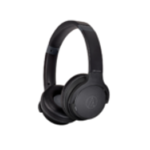 Weighing just 6.3 oz, a similar weight of a 12” vinyl record, the ATH-S220BT are the ultimate over-ear light headphones. With the wireless headphones’ 60-hour battery life, users can experience exceptional sound quality and multipoint connectivity without the concern of running out of charge during their relaxing listening sessions. The headphones’ easy-touch buttons provide control of calls and music or video playback, as well as giving users access to Siri and Google Assistant.
Weighing just 6.3 oz, a similar weight of a 12” vinyl record, the ATH-S220BT are the ultimate over-ear light headphones. With the wireless headphones’ 60-hour battery life, users can experience exceptional sound quality and multipoint connectivity without the concern of running out of charge during their relaxing listening sessions. The headphones’ easy-touch buttons provide control of calls and music or video playback, as well as giving users access to Siri and Google Assistant.
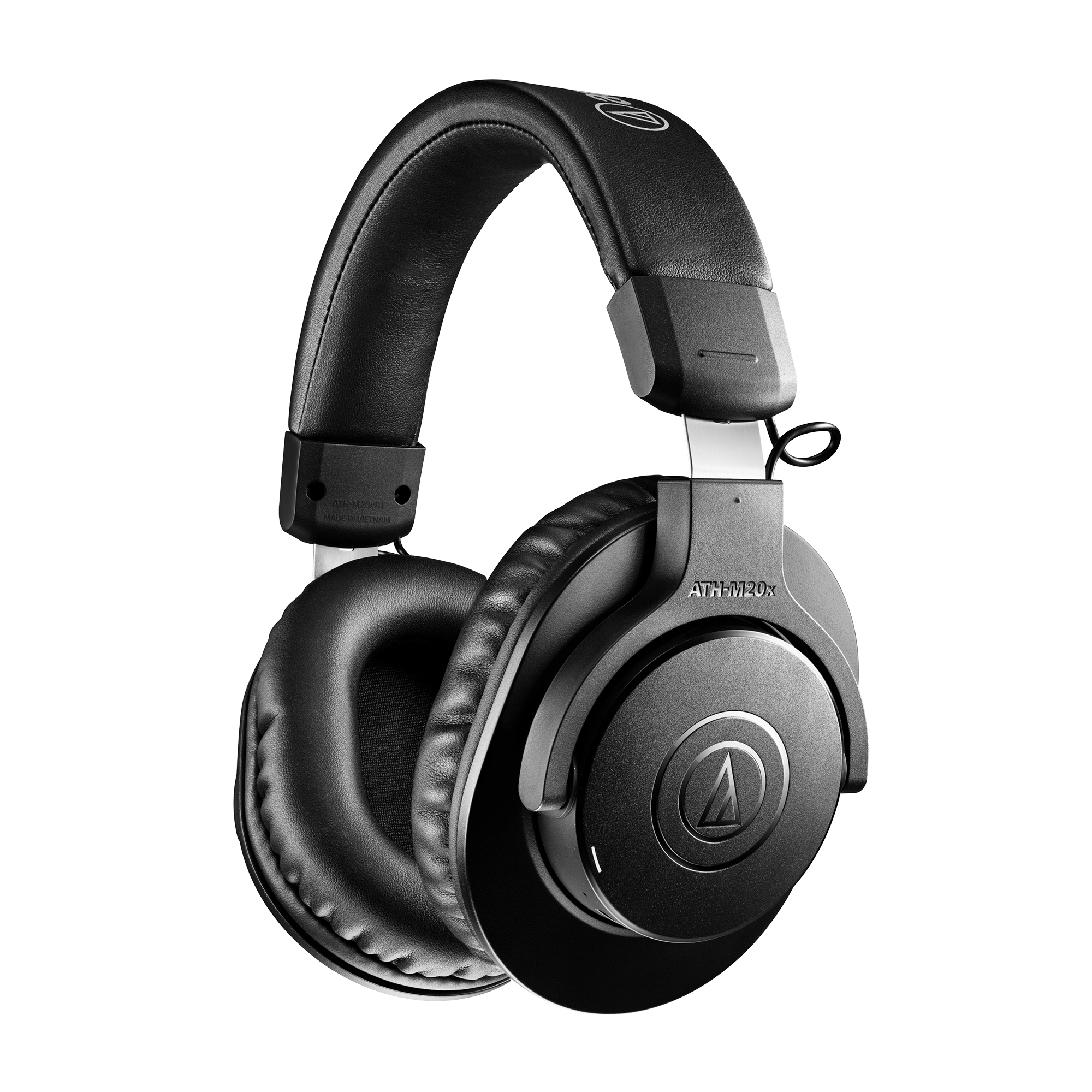 The ATH-M20xBT over-ear headphones allow you to experience a relaxing listening experience with full-range, high-fidelity audio and enhanced bass wherever you go thanks to the 40 mm drivers. These wireless headphones offer a multipoint pairing feature that enables users to stay connected to two devices at once with a battery life of up to 60 hours of continuous use on a full charge. Easily control calls, music playback, and volume with the headphones’ built-in buttons and microphone.
The ATH-M20xBT over-ear headphones allow you to experience a relaxing listening experience with full-range, high-fidelity audio and enhanced bass wherever you go thanks to the 40 mm drivers. These wireless headphones offer a multipoint pairing feature that enables users to stay connected to two devices at once with a battery life of up to 60 hours of continuous use on a full charge. Easily control calls, music playback, and volume with the headphones’ built-in buttons and microphone.
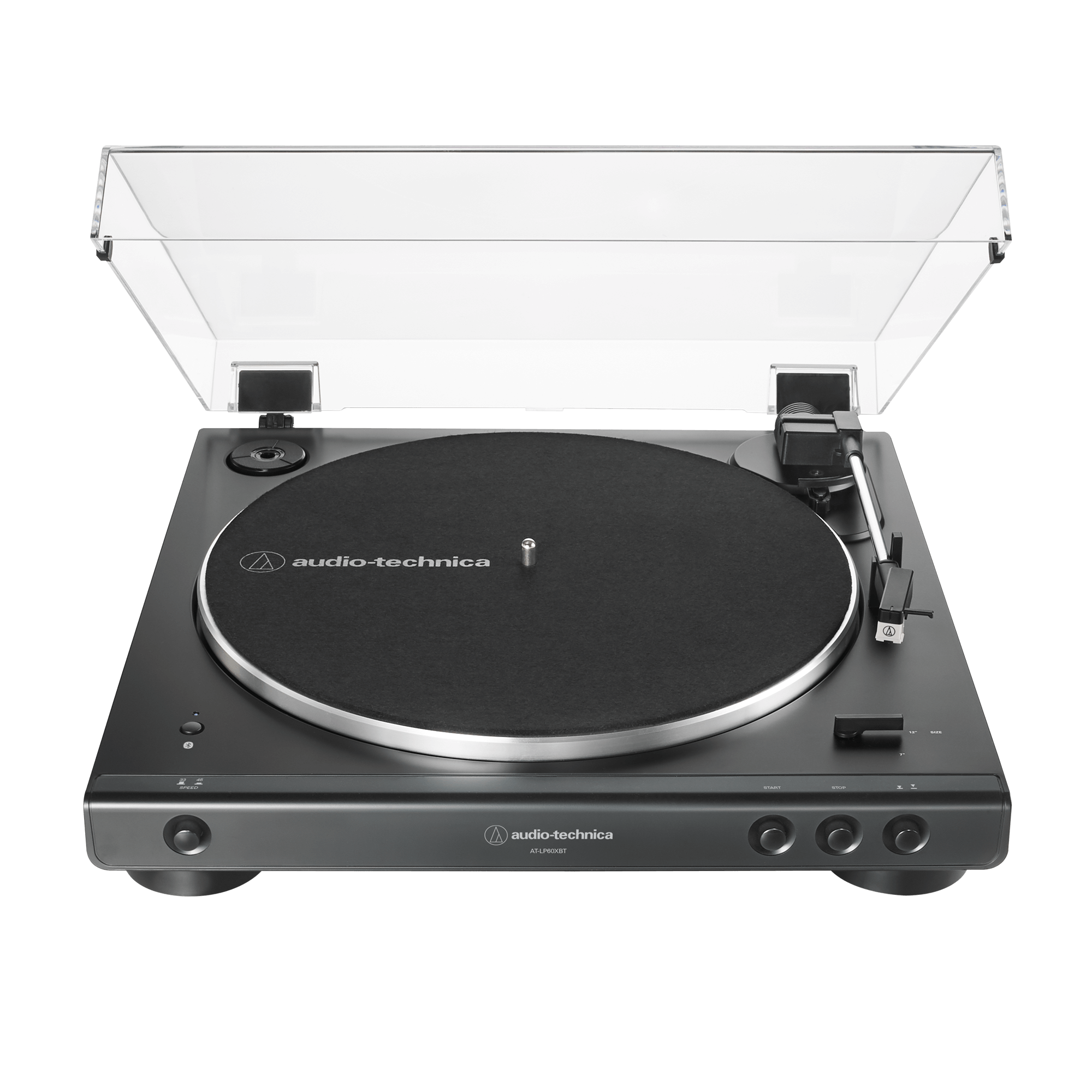
The AT-LP60XBT turntable, available in black or red, is perfect for playing music for all the relaxation benefits. The AT-LP60XBT is a fully automatic belt-drive stereo turntable with the added convenience of Bluetooth® wireless connectivity for speakers or headphones. With its CSR BT chipset, the turntable is even able to connect to devices that support the Qualcomm® aptX™ audio codec, which offers much-improved sound quality over the standard SBC code.
